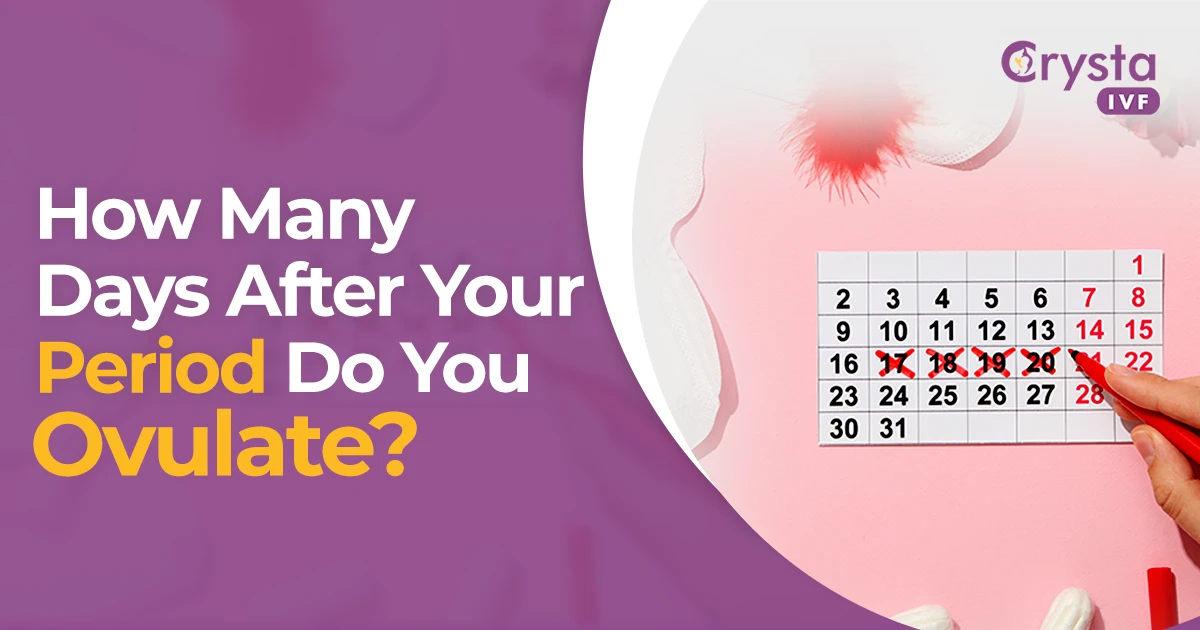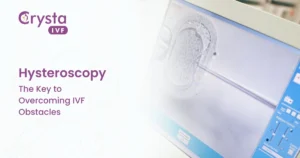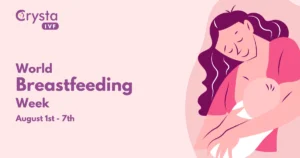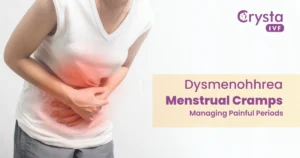Ever wondered when your body gives the green signal for pregnancy?
Very few women truly understand the rhythm of their menstrual cycle, especially when ovulation happens after their period ends. But if you’re trying to conceive (or avoid pregnancy), knowing exactly when you ovulate can make all the difference. Ovulation is that special window each month when your body is most fertile, typically landing around the middle of your menstrual cycle.
However, since every woman’s cycle is unique, ovulation doesn’t look the same for everyone. In this blog, we’ll break it down simply, how many days after your period you actually ovulate, and how to spot the signs your body gives when it’s ready.
What is Ovulation & How is it Different from Periods?
Ovulation is one of the phases of the menstrual cycle. It occurs when fully developed eggs are released from ovaries and pass through the fallopian tubes, potentially leading to sperm fertilization. In order to provide room for a fertilized egg, the uterine lining thickens. If conception is unsuccessful, the lining sheds throughout the menstrual cycle.
Some symptoms of early pregnancy are similar to ovulation, but pregnancy usually occurs when a fetus is developed inside the uterus.
How Many Days After Your Period Do You Ovulate?
The monthly hormonal cycle the body goes through to prepare for a potential pregnancy is known as the Menstrual Cycle. Ovulation occurs once a month when an ovary releases an egg that enters the uterus through fallopian tubes and is ready for fertilization. If not, the body releases this as a menstrual cycle, during which the uterine wall begins to shed its lining.
A new menstrual cycle starts on the first day of a period. The average woman’s menstrual cycle lasts 28 to 32 days, while some women experience shorter or longer cycles depending on factors such as Hypertension, Stress, lifestyle, etc.
Hence, the ovulation date falls halfway through the menstrual cycle, between 11 and 20 days. Ovulation lasts one day between this time and varies from month to month. Shorter menstrual periods are associated with a higher likelihood of ovulation around day 11. Longer menstrual periods can cause women to ovulate closer to day 20.
Learn More: What are the Phases of the Menstrual Cycle?
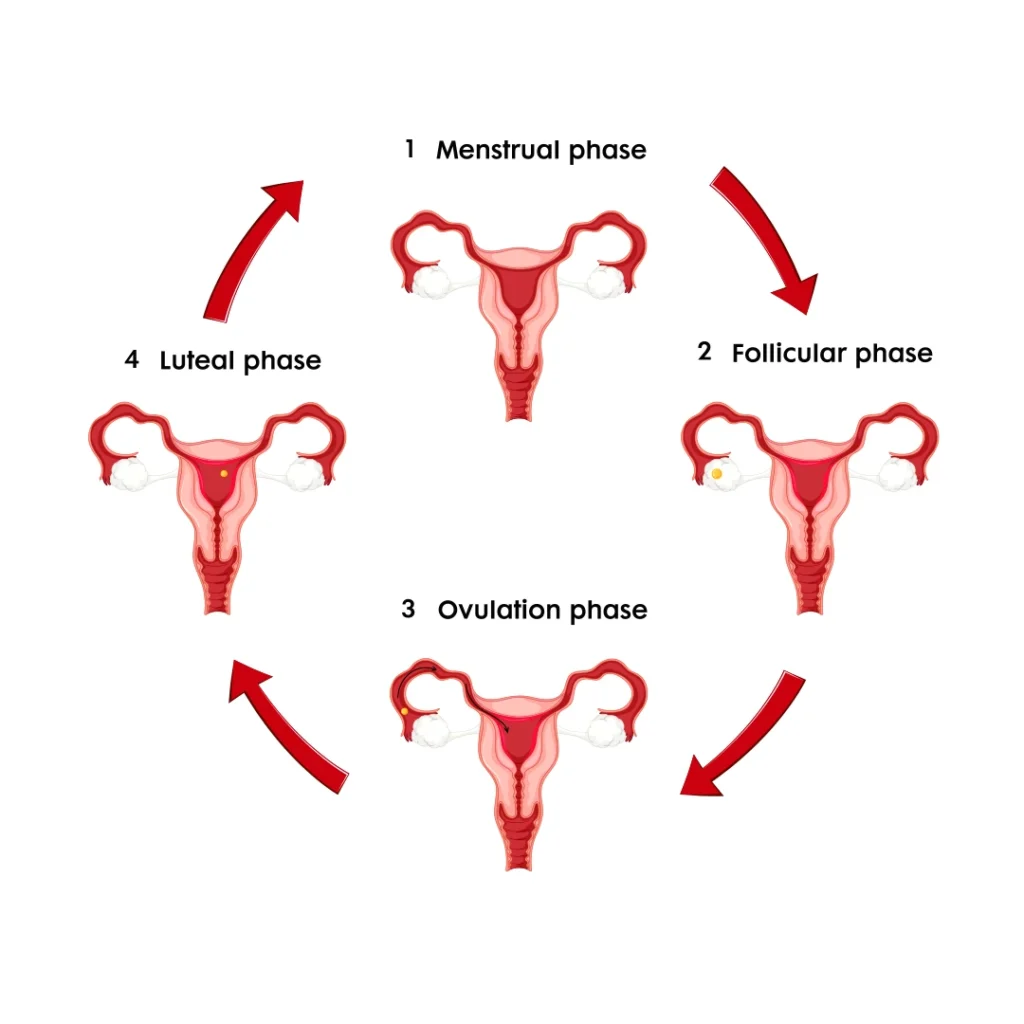
According to 2015 research on Evolution and human Behaviour, a normal cycle of 28 days will likely have these different stages.
| Day of Cycle | Stage |
| 1 to 7 | Mensuration |
| 8 to 9 | Post-Menstruation |
| 10 to 14 | Ovulation Days |
| 15 to 16 | Post Ovulation |
| 17 to 28 | Luteal Phase |
How Many Days After Your Ovulation Can You Get Pregnant?
You can get pregnant for about 24 hours after you ovulate. That’s because once the egg is released from the ovary during ovulation, it only lives for 12 to 24 hours. If a sperm meets the egg during this time, fertilisation can happen, and pregnancy can begin.
However, since sperm can live inside your body for up to 5 days, you can actually get pregnant if you have sex in the days leading up to ovulation, too. This is why your fertile window is about 5 to 6 days long, it includes the day of ovulation and the few days before it.
To increase your chances of getting pregnant, try to have sex during this fertile window, especially in the 2–3 days before ovulation and on the day you ovulate.
Learn more: What are the Phases of the Menstrual Cycle?
What are the Signs of Ovulation?
Identifying the exact date of ovulation might be difficult. Most women trace their menstrual cycle and estimate the time of ovulation using various techniques. Here are some signs by which you can know that your body is undergoing ovulation.
- An increase in body temperature
- Soreness in the breasts
- One side of the abdomen experiences a dull aching
- Variation in cervical stiffness and fluid
- Heightened desire for sex
- Bloating in the abdomen
- An enhanced perception of taste, smell, or vision
- Increased luteinizing hormone levels
5 Easiest Ways to Know You’re Ovulating
Various methods are used to determine the time and day of ovulation. To be accurate and precise, any woman who wants to know her ovulation date must follow more than one method.
Through Calendar Record
Women who use the calendar technique must record approximately six months of menstrual cycles to know their ovulation timing. During six months, find the shortest and longest cycles to determine when you might be ovulating. The shortest cycle is generally calculated by reducing 18 days, and the longest cycle is calculated by reducing 11 days from your 28 days menstruation cycle. Thus, your ovulation period occurs between day 11 and day 20 of the cycle.
Checking Body Temperature
During ovulation, your body temperature rises slightly (usually by 0.5 to 1 degree). Check your temperature each morning using a digital thermometer. This technique only functions if you take your temperature before eating, drinking, and getting out of bed. Keep recording your body temperature for a few months continuously, and mark out the days when your body temperature rises.
Noticing Cervical Mucus
Your cervix secretes a vaginal fluid called cervical mucus. During your menstrual cycle, your cervical mucus changes. Before ovulation, your cervical mucus is thick, white, and dry. Like egg whites, your cervical mucus becomes slick and transparent right before ovulation.
Using Ovulation Kit
The ovulation kit functions similarly to at-home pregnancy tests as it needs you to pee on an indicator strip in the comfort of your own home. They function by identifying luteinizing hormone, or LH, in your urine. If the result of the test is positive, you should be sure that you are about to ovulate in the coming 36 hours.
Breast Tenderness
During or near ovulation, breast or nipple discomfort or tenderness can range from minor to severe. Some people have breast soreness right before ovulation due to elevated levels of oestrogen and LH. However, the drop in oestrogen and rise in progesterone during ovulation can also cause soreness in the breasts and nipples.
What are the Signs to Know Ovulation is Over?
Your body starts giving you signals when ovulation is over. However, ovulation is difficult to recognise, so you will not get a clear judgment if the ovulation is over, but here are a few signs your body might show when your ovulation period is over.
- The cervical mucus becomes thicker, cloudier and stickier.
- Your estrogen hormone starts decreasing in the body, which reduces libido.
- The slight pain due to ovulation is gone.
- The cervix becomes soft and opens up.
- Your body temperature remains slightly high even after ovulation is over.
- Women experience peak mood swings during ovulation which subsides after the process.
How to Know If You’re Not Ovulating?
If you’re not ovulating, it means your ovaries aren’t releasing an egg every month, which can make it harder to get pregnant. Here are some signs that may indicate you’re not ovulating:
- Irregular or missed periods: If your periods are very irregular or sometimes don’t come at all, you might not be ovulating regularly.
- Very light or very heavy bleeding: Extreme changes in your menstrual flow could point to a hormonal imbalance, which affects ovulation.
- Negative ovulation test results: Ovulation predictor kits can help track your hormone levels. If they consistently show no LH surge, it may mean you’re not ovulating.
- Trouble getting pregnant: If you’ve been trying to conceive for a while without success, a lack of ovulation could be a reason.
If you’re unsure, it’s best to speak with the best fertility specialist in Delhi. They can run simple tests like blood work or an ultrasound to find out what’s going on and help guide you with the right treatment or advice.
How Long Does an Ovulation Last?
As discussed above, the ovulation just lasts for 24 hours. This is the peak time when women can try to get pregnant. However, the fertile window (the time frame within which a woman can conceive) can last for a few more days, between 5-6 days. This is because of the sperm that can survive in a woman’s uterus for such a period.
Hence, if any woman is trying long to conceive, they must track her ovulation and try to get pregnant within this time frame.
Learn More: How many days egg live in uterus after ovulation?
How Ovulation Affects Fertility?
The ovulation period is the accurate period for conceiving a child. Parents who engage in sexual activity between five days before ovulation and one day following it are more likely to become pregnant.
Additionally, the likelihood of conception increases with proximity to ovulation. During ovulation, the egg travels to the fallopian tube, where it meets with the sperm, and fertilization takes place. If fertilization does not occur within 24 hours of the release, the egg is dissolved.
The Bottom Line
Ovulation is a typical stage of the menstrual cycle during which the ovaries release eggs to prepare them for fertilization. It is how the body prepares for pregnancy.
Everybody’s menstrual cycle is not the same length. As such, an individual must maintain a cycle record to conceive. In case you are still confused with your menstrual cycle or ovulation period, consult with an expert doctor at Crysta IVF – Best IVF Centre in Delhi. We have highly experienced doctors who provide personalized care and treatment to each patient.
Frequently Asked Questions
Ques: Can I get pregnant after five days of my periods?
Ans: Having unprotected sex during any time of the menstrual cycle can get you pregnant. The highest chance of getting pregnant is during ovulation, although one can get pregnant after five days of the period.
Ques: How do I know if I am ovulating?
Ans: If you can observe a thick mucus layer in your underwear or you have soreness in your breast, there is a high chance that you might be ovulating. Some other common ovulation symptoms include dull aching, abdominal pain, and increased body temperature.
Ques: How do I calculate my fertile days?
Ans: The fertile days are commonly known as Ovulation. Your menstrual cycle starts on the first day of the period, and exactly between 11 to 20 days, you might experience ovulation. These are the most fertile days in which you can get pregnant.
Ques: How many days after your periods can you get pregnant?
Ans: You can get pregnant anytime, even during your period. The chances are higher between 11 to 20 days of your menstrual cycle.
Ques: If my period lasts 3 days, when do I ovulate?
Ans: The ovulation cycle begins on the 11th day of your cycle. The ovulation will generally occur on the 14th day of the cycle, which can vary from person to person.
Ques: How many days after your period do you ovulate?
Usually, you ovulate about 12–14 days after the first day of your period, if you have a regular 28-day cycle. If your cycle is shorter or longer, ovulation can vary slightly.
Ques: What is an ovulation calculator?
An ovulation calculator helps estimate your fertile window (the days you’re most likely to get pregnant) by tracking your period start date and cycle length. It predicts when you’re likely to ovulate.
Ques: How long does ovulation last?
Ovulation itself lasts about 12 to 24 hours. However, your fertile window (the time you can get pregnant) is about 6 days because sperm can survive inside you for a few days before the egg is released.
Ques: What are the signs that ovulation is over?
Signs ovulation is over include:
- Drop in cervical mucus (it becomes thick and dry)
- Breast tenderness reduces
- Decrease in libido
- Basal body temperature rises after ovulation

